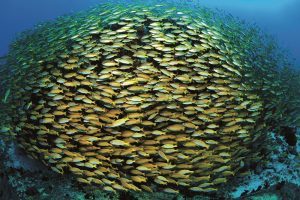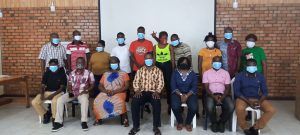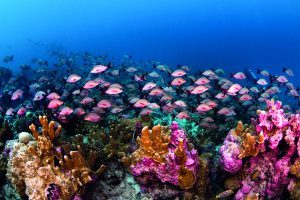Seychelles’ Fisheries: “We Have Nothing to Hide; We Have Everything to Share”
Pesquerías en Seychelles: “No tenemos nada que esconder; tenemos todo por compartir”
In a milestone for global transparencyAccording to OGP’s Articles of Governance, transparency occurs when “government-held information (including on activities and decisions) is open, comprehensive, timely, freely available to the pub... More efforts in marine fisheries management, Seychelles submitted the world’s first report to the Fisheries Transparency Initiative (FiTI) in mid-April, fulfilling a crucial commitmentOGP commitments are promises for reform co-created by governments and civil society and submitted as part of an action plan. Commitments typically include a description of the problem, concrete action... of its current OGP action planAction plans are at the core of a government’s participation in OGP. They are the product of a co-creation process in which government and civil society jointly develop commitments to open governmen....
The Republic of Seychelles has become the first country in the world to conduct a comprehensive assessment of the levels of transparency across all aspects of its fisheries sector.
The results of this assessment are laid out in Seychelles’ first report to the Fisheries Transparency Initiative (FiTI), a global multi-stakeholder partnership defining for the first time what fisheries information governments should publish online.
In a bold statement made at the launch of Seychelles’ first FiTI Report, the Minister for Fisheries and the Blue Economy Jean-François Ferrari declared:
“This government has a clear vision to make Seychelles’ fisheries the most transparent in the world. We have nothing to hide; we have everything to share.”
The report was vetted and approved by Seychelles’ FiTI National Multi-Stakeholder Group (MSG), composed equally of government, business and civil society representatives. Such a multi-stakeholder endeavour is not only in line with SDG 17, but is also a prerequisite for ensuring the contents of the report are seen as credible and trustworthy.
A main conclusion of the report is that a mind shift towards proactive ‘open government’ is still needed in Seychelles’ fisheries. The enactment of the country’s Access to Information Act in 2018 initiated a new governance paradigm from one of secrecy to one of transparency. But the FiTI Report highlights that while a substantial amount of information on Seychelles’ fisheries sector is collated by national authorities (e.g. the Seychelles Fishing Authority), this information has often not been published online or is not easily accessible to the public.
The report also emphasises that significant gaps in the online availability of fisheries information may have led to controversies over certain aspects of Seychelles’ fisheries among the general public in the past.
As part of the FiTI Report, a host of previously unpublished information is now also publicly available, such as fishing access agreements between Seychelles and Mauritius, key legal, policy and management documents, and a summary of the status of fish stocks. Furthermore, the report shows that past disclosure practices, e.g. regarding fisheries subsidies, have not been in line with the country’s own legal requirements as stipulated in the Access to Information Act.
The report concludes with 34 practical recommendations from the National MSG on how Seychelles can further strengthen the public availability, accessibility and credibility of its fisheries information. These include, for example, publishing a summary description of the various types of fisheries in Seychelles to facilitate public understanding, making available the results of all recent stock assessments, and establishing an up-to-date, online vessel registry in line with the requirements of the FiTI Standard. Work to implement these recommendations has already begun in earnest.
Rooted in its engagement with the OGP, Seychelles is now looking to build on this achievement and ‘spread the word’. On the national level, members of Seychelles’ National MSG are currently preparing for a ‘Tour des Seychelles’, in which they will present the FiTI Report to various fisheries stakeholders and encourage them to debate and engage with its contents. This is an important step for ensuring informed public discourse on fisheries transparency in Seychelles, as highlighted in the country’s latest Independent Reporting Mechanism (IRM) report.
Internationally, with over 80% of the 78 OGP member countries sharing a coastline with either an ocean or sea, the global OGP network represents a fantastic avenue for Seychelles to share its experiences of promoting fisheries transparency with other maritime states, while also demonstrating a practical sectoral solution approach for access to information.
Seychelles is already preparing its next annual FiTI Report – expected by the end of 2021 – in order to follow up closely on progress made towards enhancing transparency in marine fisheries.
Leading by example, Seychelles is confident that other OGP countries will follow, helping to create a much needed level playing field by making the sharing of information on fisheries the norm, and not the exception.
En un hito en los esfuerzos globales de transparencia del manejo de pesquerías marinas, Seychelles entregó el primer informe de todo el mundo a la Iniciativa de Transparencia Pesquera (FiTI por sus siglas en inglés) a mediados de abril, cumpliendo con un compromiso de su actual plan de acción de OGP.
La República de Seychelles es el primer país del mundo en llevar a cabo una evaluación completa de los niveles de transparencia de todos los aspectos de su sector pesquero.
Los resultados de esta evaluación están plasmados en el primer informe de Seychelles a la Iniciativa de Transparencia Pesquera (FiTI por sus siglas en inglés), una alianza global multisectorial que, por primera vez, está definiendo la información sobre pesquerías que los gobiernos deben publicar en línea.
En una declaración audaz presentada durante el lanzamiento del primer informe de Seychelles ante la FiTI, el Ministro de Pesca y Economía Azul Jean-François Ferrari declaró:
“Este gobierno tiene la visión clara de hacer de las pesquerías de Seychelles las más transparentes del mundo. No tenemos nada que ocultar; tenemos todo por compartir.”
El informe fue vetado y aprobado por el grupo multisectorial de FiTI de Seychelles, el cual está compuesto por representantes de gobierno, empresas y la sociedad civil de forma equitativa. La naturaleza multisectorial de esta iniciativa no solo está alineada con el ODS 17, sino que además es un requisito para asegurar que los contenidos del informe sean creíbles y confiables.
Una de las conclusiones más importantes del informe es que aún es necesario hacer un cambio de mentalidad hacia un “gobierno abierto” proactivo en las pesquerías de Seychelles. La publicación de la Ley de Acceso a la Información en 2018 inició un nuevo paradigma de gobernanza, desde la secrecía hacia la transparencia. Pero el informe de la FiTI destaca que, aunque una parte sustancial de la información del sector pesquero de Seychelles es cotejada por las autoridades nacionales (por ejemplo la Autoridad Pesquera de Seychelles), la mayoría de esta información no ha sido publicada en línea y la ciudadanía no tiene acceso a ella.
Además, el informe identificó que los vacíos en la disponibilidad de información pesquera podría haber llevado a controversias sobre ciertos aspectos de las pesquerías de Seychelles entre el público en general.
Como parte del informe FiTI, se publicó información que anteriormente no estaba disponible, por ejemplo acuerdos entre Seychelles y Mauricio, documentos legales, políticas e instrumentos de manejo y un resumen del estatus de los stocks pesqueros. Además, el informe muestra que las prácticas anteriores de transparencia (por ejemplo lo relacionado con subsidios pesqueros) no están de acuerdo con los requisitos legales del país como lo estipula la Ley de Acceso a la Información.
El reporte incluye 34 recomendaciones prácticas del grupo multisectorial nacional sobre cómo Seychelles puede seguir fortaleciendo la disponibilidad, accesibilidad y credibilidad de su información pesquera. Algunos ejemplos de ello son la publicación de una descripción de los tipos de pesquerías de Seychelles para el público, publicar los resultados de las evaluaciones de stocks y establecer un registro digital actualizado de acuerdo con los requisitos del estándar de la FiTI. El trabajo de implementar estas recomendaciones ya inició.
Como parte de su colaboración con OGP, Seychelles está trabajando en aprovechar este logro y difundir el mensaje. A nivel nacional, los miembros del grupo multisectorial de Seychelles están preparando el “Tour des Seychelles”, en el que presentarán el informe de la FiTI a varios actores y los invitarán a discutir sus contenidos. Este paso asegurará una discusión informada sobre la transparencia pesquera, como lo recomendó el más reciente informe del Mecanismo de Revisión Independiente (IRM por sus siglas en inglés).
A nivel internacional, más del 80 % de los 78 miembros de OGP tienen línea de costa que colinda con algún océano o mar, por lo que la red global de OGP representa una plataforma que Seychelles puede aprovechar para compartir sus experiencias en cuanto a la transparencia pesquera con otros estados marítimos y mostrar una solución sectorial al acceso a la información.
Seychelles ya está trabajando en su siguiente informe anual a la FiTI, el cual se espera publicar a finales de 2021, con lo que se dará seguimiento cercano a los avances en la transparencia en las pesquerías marinas.
Con su liderazgo, Seychelles cree que otros países de OGP seguirán sus pasos, haciendo que la publicación de información pesquera sea la norma y no la excepción.
No comments yet
Related Content
 Challenges and Solutions
Challenges and Solutions
Transparency in Fisheries: A Clear Way Ahead for Seychelles
With the future of the world‘s fisheries seriously threatened, the Seychelles is leading the way in increasing the credibility and quality of national fisheries information.

A Guide to Open Government and the Coronavirus: Green Transitions – Climate and Environment
The economic, social, climate, and health crises of 2020 are undoubtedly costly, but they present an opportunity to build back more sustainably...
 Challenges and Solutions
Challenges and Solutions
Co-Creating During the Pandemic: Lessons from Liberia
Since signing up to OGP in 2011, Liberia has reiterated its commitments to transparency and accountability on issues ranging from beneficial ownership to budget transparency to openness in healthcare delivery.


Leave a Reply